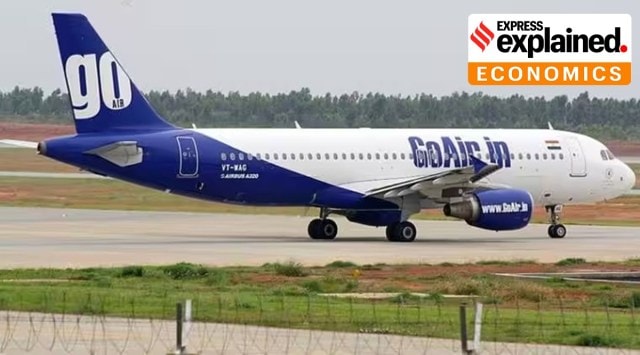As the embattled carrier Go First filed for voluntary insolvency in May, lessors who had leased aircraft to the crisis-hit budget airline made a beeline to repossess their planes. But despite there being provisions to deregister and repossess leased aircraft within a matter of days, the lessors still have not been able to gain control of their planes from Go First.
The reason? Under India’s Insolvency and Bankruptcy Code (IBC), the admission of an insolvency plea by the National Company Law Tribunal (NCLT) results in an immediate and complete moratorium on recovery of assets leased to the debtor (Go First in this case).

What is this automatic moratorium based on?
India is a signatory to the Convention on International Interests in Mobile Equipment and the related protocol, commonly known as the Cape Town Convention (CTC), as per which lessors can seek deregistration and export of aircraft without consent of the airline using their Irrevocable Deregistration and Export Request Authorizations (IDERAs). However, it is yet to be fully incorporated into India’s legal framework, which so far has meant that in cases of conflict of the CTC provisions with Indian laws, the latter would generally prevail.
The government has now acted on the matter, providing some relief and assurance to aircraft leasing firms that had been spooked. In a recent notification issued by the Ministry of Corporate Affairs (MCA), transactions and agreements relating to aircraft, aircraft engines, airframes, and helicopters in line with the CTC have been exempted from relevant sections of the IBC. Put simply, going forward, the automatic moratorium on assets under the IBC will not be applicable to aircraft, aircraft engines, airframes, and helicopters
This means that if an airline files for insolvency, the provisions of the IBC will no longer be a hindrance in the repossession of aircraft by lessors.
Why does it matter?
The inability of lessors to take back their planes from Go First has hit India’s reputation as an aviation market among global aircraft financiers and lessors. In late September, the Aviation Working Group (AWG) downgraded India, which could lead to higher risk premiums for other Indian carriers. The AWG is an international not-for-profit comprising major aviation manufacturers, leasing companies, and financial institutions. It is considered an international watchdog for the aircraft financing and leasing industry.
Higher lease rentals push up the costs for airlines, which already operate in a business environment fraught with volatile fuel prices and phases of cut-throat competition resulting in wafer-thin margins.
Story continues below this ad
With major Indian carriers on an expansion spree with nearly a thousand aircraft on order over the next few years, it is important that global aircraft leasing firms develop a favourable view of the Indian aviation market and are not spooked by the possible unpredictability of the legal framework and the operating environment.
As part of its vision for the country’s civil aviation sector, the government wants India to emerge as a hub for aircraft leasing. So far, Indian carriers have mostly leased aircraft from traditional hubs like Ireland, Singapore, and Hong Kong. Alignment and consistency with international civil aviation conventions, protocols, and norms would be prerequisites for the ecosystem to develop in India.
Lessors’ struggle with Go First
While aircraft financing and leasing firms will draw relief from the MCA notification, it is unlikely that the MCA notification will instantly enable Go First’s lessors to repossess their aircraft. This is because government notifications, unless specified otherwise, are effective prospectively and not retrospectively.
Go First’s lessors are, however, expected to seek relief from courts on the basis of the latest notification. Matters pertaining to the repossession of Go First aircraft by lessors are currently sub-judice.
Story continues below this ad
While Go First’s aircraft lessors had applied to the Directorate General of Civil Aviation (DGCA) to repossess their planes from the embattled carrier in May, the admission of Go First’s insolvency plea by the NCLT resulted in a moratorium coming into play, prohibiting recovery of any asset in possession of the corporate debtor by the owner of the asset, aircraft in this case. Had the lessors been able to take back their planes, hopes of Go First’s revival would have been extinguished.
Go First had announced on May 2 that it was voluntarily filing for insolvency under the IBC. Between May 4 and May 9, lessors sought deregistration and repossession of 45 of Go First’s total fleet of 55 aircraft. The lessors asked the Directorate General of Civil Aviation (DGCA) to allow them to repossess and fly out the planes using their IDERAs.
An IDERA empowers lessors to get their aircraft deregistered from the registry of the country where the lessee is based, repossess them, and fly them out, in cases like lease payment defaults. As per norms, aviation regulators are required to deregister the aircraft and allow the lessors to repossess them within five working days of a request being filed.
However, before the regulation five working days, the NCLT admitted the airline’s plea and the moratorium on assets came into effect.
Story continues below this ad
Cape Town Convention and India
The CTC and the related 2001 protocol on matters specific to aircraft equipment are key elements of the global aviation structure that aim to protect lessors’ interests in case of defaults by the lessee. As per the CTC, the lessor can seek deregistration and export of aircraft without the consent of the airline using IDERA. The airline has no power to revoke the lessor’s IDERA rights without the latter’s consent.
Put simply, the objective is to simplify and improve the efficiency of aircraft leasing operations, while providing comfort to lessors that their assets (planes) would not get stuck for extended periods due to legal issues. The quick deregistration process allows lessors to repossess planes and lease those out to other operators, minimising the losses they would have to incur if their planes get stuck in litigation. This makes lessors ready and willing to lease out aircraft in countries that follow the CTC protocols in letter and spirit.
Although India became a party to the CTC back in 2008, the incorporation of the convention and its protocol into India’s legal framework has been a work in progress. The last CTC-related amendments to India’s aviation rules took place in 2018, simplifying deregistration and export of aircraft through IDERAs.
For the past few years, the government has been planning to enact legislation to ensure that the CTC provisions prevail in cases of conflict with Indian laws. However, the bill has so far not been tabled in Parliament. With the MCA notification, the government has tried to resolve the most contentious issue arising out of the lack of Indian legislation that would give primacy to the provisions of the CTC.








































